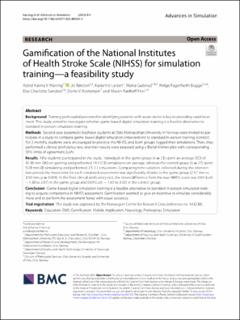Gamification of the National Institutes of Health Stroke Scale (NIHSS) for simulation training—a feasibility study
Harring, Astrid Karina V.; Røislien, Jo; Larsen, Karianne; Guterud, Mona; Bugge, Helge Fagerheim; Sandset, Else Charlotte; Kristensen, Dorte Vesterager; Hov, Maren Ranhoff
Peer reviewed, Journal article
Published version
Permanent lenke
https://hdl.handle.net/11250/3065675Utgivelsesdato
2023Metadata
Vis full innførselSamlinger
Originalversjon
Harring, A. K. V., Røislien, J., Larsen, K., Guterud, M., Bugge, H. F., Sandset, E. C., ... & Hov, M. R. (2023). Gamification of the National Institutes of Health Stroke Scale (NIHSS) for simulation training—a feasibility study. Advances in Simulation, 8(1), 4. 10.1186/s41077-023-00245-4Sammendrag
Background
Training prehospital personnel in identifying patients with acute stroke is key to providing rapid treatment. This study aimed to investigate whether game-based digital simulation training is a feasible alternative to standard in-person simulation training.
Methods
Second-year paramedic bachelor students at Oslo Metropolitan University in Norway were invited to participate in a study to compare game-based digital simulation (intervention) to standard in-person training (control). For 2 months, students were encouraged to practice the NIHSS, and both groups logged their simulations. Then, they performed a clinical proficiency test, and their results were assessed using a Bland-Altman plot with corresponding 95% limits of agreement (LoA).
Results
Fifty students participated in the study. Individuals in the game group (n = 23) spent an average (SD) of 42:36 min (36) on gaming and performed 14.4 (13) simulations on average, whereas the control group (n = 27) spent 9:28 min (8) simulating and performed 2.5 (1) simulations. Comparing time variables collected during the intervention period, the mean time for each simulated assessment was significantly shorter in the game group (2:57 min vs. 3:50 min, p = 0.004). In the final clinical proficiency test, the mean difference from the true NIHSS score was 0.64 (LoA: − 1.38 to 2.67) in the game group and 0.69 (LoA: − 1.65 to 3.02) in the control group.
Conclusion
Game-based digital simulation training is a feasible alternative to standard in-person simulation training to acquire competence in NIHSS assessment. Gamification seemed to give an incentive to simulate considerably more and to perform the assessment faster, with equal accuracy.

